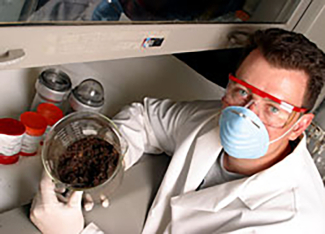
Two Master of Science degrees are offered: the Master of Science Thesis degree and the Master of Science Non-Thesis degree. Admission to either program is competitive and requires a B.S. degree.
Completion of a Masters of Science with thesis requires that each student perform original research advised by one of the core faculty of the Environmental Engineering program, this faculty member will be the Chair of the thesis defense committee. Ordinarily, the Thesis Committee Chair will arrange financial support for the student and the research. A thesis Master's degree typically requires two years (or more) of full time effort to complete the course work, plan and perform the research, and write and defend the thesis.
The thesis M.S. degree requires 24 credit hours of academic course work, six credit hours of thesis (CIVE 6399 and CIVE 7399), plus enrollment in seminar at least twice. Full-time M. S. students receiving financial support must register for 9 credit hours each Fall and Spring semester. Full-time students may substitute CIVE 6X98 (X Credit Hours of Research) for academic course work in any semester. Enrollment in CIVE 6X98 requires a faculty research advisor who will assign a grade-"S" for Satisfactory or "U" for Unsatisfactory. Leveling and prerequisite courses are not counted in the above requirements (see non-engineers for more information).
The Masters of Science non-Thesis degree requires that the student take 30 credit hours of course work. Non-thesis students are self-supporting, and working students usually enroll part time. Taking 2 classes per long semester a student can complete the non-thesis masters degree in 5 semesters (2.5 years). Students are required to take the seminar class CIVE 6111 one semester as part of the non-thesis degree. CIVE 6111 seminar hours are not counted in the 30-hour requirement.
Only two courses (6-credit hours) below the 6000 level may be applied to the M.S. degree. These courses must be approved by the Director and the Associate Dean by means of a Graduate General Petition. Students need to obtain approval from the Program Academic Advisor or Program Director before enrolling in non-graduate courses for which graduate credit is anticipated.